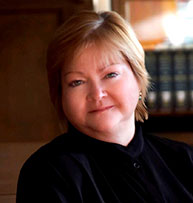Judy Shepard

Judy Shepard, gay rights advocate and mother of Matthew Shepard, gave a talk titled, “The Legacy of Matthew Shepard,” as part of the President's Forum Series on April 25, 2013, at 7:30 p.m. in the Vandervort Room.
On October 8, 1998, Judy and Dennis Shepard were awakened in the middle of the night in Saudi Arabia, where Dennis works, by a telephone call no parent should ever have to receive. What they heard changed their lives forever. Their eldest son, Matthew, was in a coma after having been brutally attacked—because he was gay. The distraught parents flew to Ft. Collins, Colorado, and met-up with their youngest son, Logan, to visit Matthew in the hospital. On October 12, Matthew passed away.
While the Shepard family mourned in private, the tragedy quickly spurred a spontaneous, unprecedented public outcry from coast to coast. The incident galvanized millions of people, and focused the nation’s attention on the growing epidemic of hate crimes. Vigils were held across America. The Shepard family received tens of thousands of letters and e-mails of support.
Matthew Shepard may have been small in stature, but he had a big heart. Fighting for social justice was central to who he was, and it formed a significant part of his life. In the aftermath of his death, Judy and Dennis Shepard started the Matthew Shepard Foundation (www.matthewshepard.org) to help carry on Matthew’s legacy by embracing the just causes their son had championed. This includes working for gay and lesbian equality, and helping to prevent hate crimes. The play, and subsequent critically-acclaimed HBO movie, The Laramie Project, was written about Matthew and is performed frequently to draw attention to gay rights and the ending of hate crimes.
On May 11, 1999, Shepard testified before the Senate Judiciary Committee in support of the Hate Crimes Prevention Act. In front of the committee, she delivered a powerful message to those who oppose hate crimes laws: “I can assure opponents of this legislation firsthand, it was not words or thoughts, but violent actions that killed my son.”
She has appeared in two Human Rights Campaign public service television spots aimed at curbing anti-gay violence and promoting a greater understanding of gay issues. Produced by the Matthew Shepard Foundation, they were distributed during the autumn of 1999 to every network affiliate and cable operator in the US who uses public service announcements. In one of the ads, there is a home video of Matthew on-screen as Shepard says: “In a perfect world, because your child is gay, you don’t worry about their safety. You just worry about them being happy. I loved Matt just the way he was. Just the way he was.”
In September 1999, she agreed to appear in another television public service announcement (PSA) campaign decrying hate crimes. Sponsored by the Gay, Lesbian, and Straight Education Network (GLSEN), the PSA began airing on MTV in October 1999.
She has also become actively involved with Parents, Families, and Friends of Lesbians and Gays (PFLAG), and she wrote an open letter to school administrators that the organization included in a mailing to high school counselors around the US. In the letter, she encourages the school officials to make schools safer for gay students by promoting tolerance, and reprimanding students who harass gay students.
Judy Shepard is determined to use her grief over her son’s death to make a difference—to do what she can to ensure that no other parent will have to endure what she has. She is now speaking to audiences nationwide about what they can do to make their schools and communities safer for everyone, regardless of their race, sex, religion, or sexual orientation. “I feel Matthew with me every day, or I would not be able to do this,” she says. “We just hope we’re doing what he would want us to do. We realize that we must use the voice his death has given us. I realize that what I can try and accomplish is to make people aware. We get so complacent in our lives that we forget not everyone is safe, and frequently, it is our children who aren’t safe.”
This information is accurate for the time period that this person(s) spoke at Hobart and William Smith.
